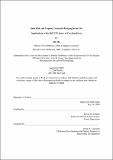| dc.contributor.advisor | David M. Geltner. | en_US |
| dc.contributor.author | Ma, Jia, S.M. Massachusetts Institute of Technology | en_US |
| dc.contributor.other | Massachusetts Institute of Technology. Center for Real Estate. Program in Real Estate Development. | en_US |
| dc.date.accessioned | 2010-05-25T19:20:51Z | |
| dc.date.available | 2010-05-25T19:20:51Z | |
| dc.date.copyright | 2009 | en_US |
| dc.date.issued | 2009 | en_US |
| dc.identifier.uri | http://hdl.handle.net/1721.1/54859 | |
| dc.description | Thesis (S.M.)--Massachusetts Institute of Technology, Program in Real Estate Development in Conjunction with the Center for Real Estate, 2009. | en_US |
| dc.description | This electronic version was submitted by the student author. The certified thesis is available in the Institute Archives and Special Collections. | en_US |
| dc.description | Cataloged from student submitted PDF version of thesis. | en_US |
| dc.description | Includes bibliographical references (p. 65). | en_US |
| dc.description.abstract | This thesis examines how the basis risk affects property derivative hedging in the UK market, based on the tracking error (basis risk) report from the Investment Property Forum study in 2007 (the IPF Study). The thesis first analyzes the risks relevant to hedging and defines the basis risk. Considering hedgers with different objectives measure hedging efficiency differently, this thesis divides the hedging users into two major categories: β-Avoidance hedgers and a-Usage hedgers. Each of these has two sub-ordinate groups. In order to quantify the basis-risk influences on hedging, a Monte Carlo simulation designed for short contract of the swap is used. Basis risks of portfolios with different sizes are selected from the IPF Study. To shed light on different hedging uses, three scenarios are tested based on different assumptions on the expected alpha and leverage. Other relevant elements are also studied, such as the price of the debt and the swap. The analysis results in a useful reference for investors who are interested in eliminating portfolio risks with hedging strategies. In the end, the thesis suggests avenues for the further study. | en_US |
| dc.description.statementofresponsibility | by Jia Ma. | en_US |
| dc.format.extent | 73 p. | en_US |
| dc.language.iso | eng | en_US |
| dc.publisher | Massachusetts Institute of Technology | en_US |
| dc.rights | M.I.T. theses are protected by
copyright. They may be viewed from this source for any purpose, but
reproduction or distribution in any format is prohibited without written
permission. See provided URL for inquiries about permission. | en_US |
| dc.rights.uri | http://dspace.mit.edu/handle/1721.1/7582 | en_US |
| dc.subject | Center for Real Estate. Program in Real Estate Development. | en_US |
| dc.title | Basis risk and property derivative hedging in the UK : implications of the 2007 IPF Study of tracking error | en_US |
| dc.type | Thesis | en_US |
| dc.description.degree | S.M. | en_US |
| dc.contributor.department | Massachusetts Institute of Technology. Center for Real Estate. Program in Real Estate Development. | en_US |
| dc.contributor.department | Massachusetts Institute of Technology. Center for Real Estate | |
| dc.identifier.oclc | 609672230 | en_US |
